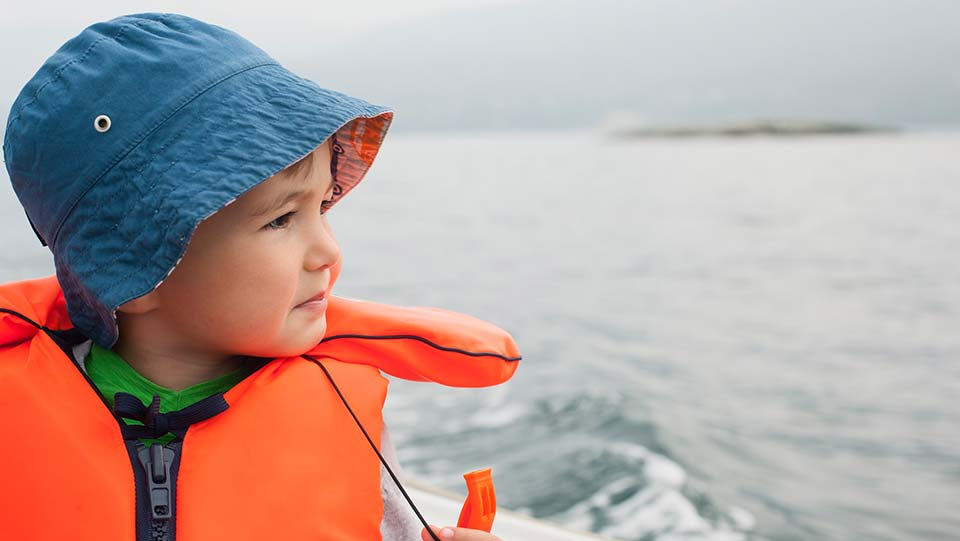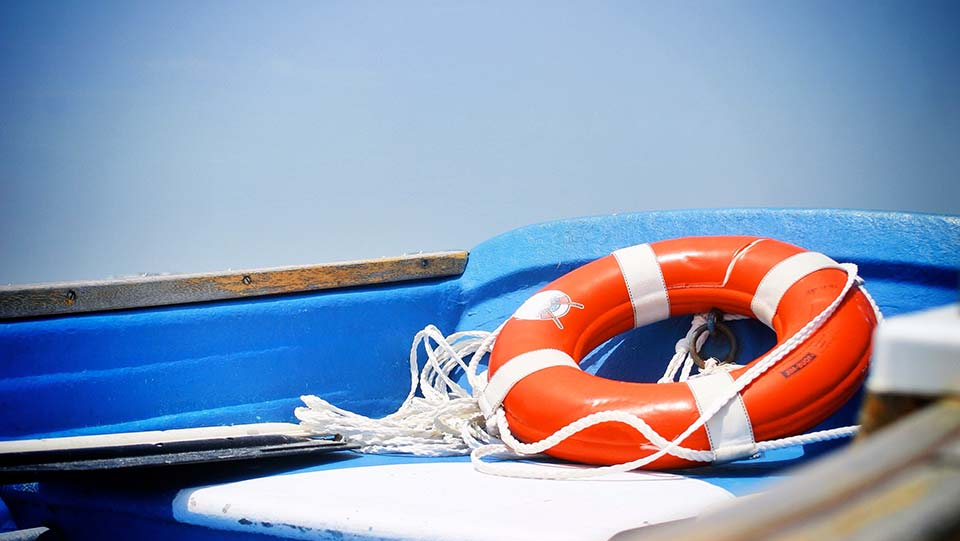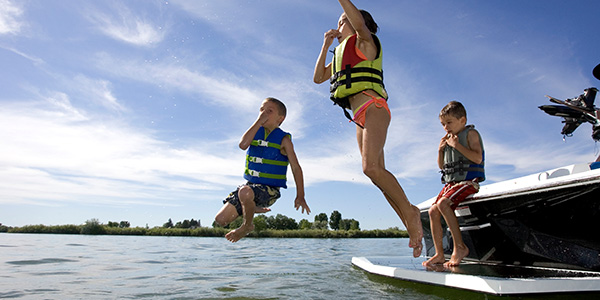How to Launch a Boat Safely

(SPEECH)
[MUSIC PLAYING]
(DESCRIPTION)
Logo, TRAVELERS, red umbrella. Text, How to Launch a Boat. Animated woman backs boat into water down a ramp while a man stands on the dock.
(SPEECH)
Learning to launch a boat takes practice. It also calls for preparation and safety measures. Here are some tips.
Step one, prepare your boat. Before you get in the launch lane, make sure all electronics are mounted. Load all your supplies in advance.
(DESCRIPTION)
G.P.S., First Aid kit, Battery on.
(SPEECH)
Ensure your battery is switched on and check that the stern plug is in place. Remove any transom straps if you have them. Secure your dock lines and place them in the vessel. You'll need them later.
(DESCRIPTION)
The woman smiles and checks items off a list.
(SPEECH)
Step two, descend the ramp. Back your trailer down in a straight line just until its wheels reach the edge of the water. Have someone be your spotter to signal when you've gone far enough.
Be careful not to go too far. You don't want to get stuck. Once the back third of the boat is floating, you're ready to launch.
Step three, launch your boat. Place your vehicle in park. Engage the parking brake too. Walk around to the bow. Grab the bowline you secured earlier and firmly grasp it. Disconnect the winch strap from the boat's bowline Your boat should now be floating freely.
Once the boat is fully floating and in the safe hands of your spotter, you can park your vehicle. Before you head out on the water, make sure you're protected with boat insurance. Contact your independent agent or Travelers representative today.
[MUSIC PLAYING]
(DESCRIPTION)
Logo, TRAVELERS, red umbrella. Text, Talk to your Travelers representative or independent agent today. travelers dot com. Travelers Casualty and Surety Company of America and its property casualty affiliates. One Tower Square, Hartford, C.T., 0 6 1 8 3. This material does not amend, or otherwise affect, any insurance policy issued by Travelers. It is not a representation that coverage does or does not exist for any particular claim or loss under any such policy. Coverage depends on the facts or circumstances involved in the claim or loss, all applicable policy provisions, and any applicable law. Please note that a particular tip may not be effective in every situation. We encourage you to use your own judgment about what's appropriate and always consider safety.
Boating can bring great fun and special memories for all. Whether you’re fishing, waterskiing, tubing or just gliding across the waves, you’ll want to ensure your time on the water is a success. To make this happen, you first need to get your boat safely into the water. Though that may sound obvious, it takes practice and preparation to launch a boat correctly.
In fact, following boat launch guidelines is as important as practicing boat safety when you’re out on the water. And once you know the appropriate steps for launching and towing a boat, you can potentially avoid dangerous and costly boating accidents.
Tips for launching a boat safely
Launching a boat can be a stressful experience. To help make the process easier, start practicing in an empty staging area or parking lot, or at the boat ramp during low traffic times. Avoid busy boating periods such as days in late spring, the summer, weekends and holidays. Then practice maneuvering your trailered boat in reverse and getting the boat off the trailer and into the water.
When you feel comfortable with your launching skills, it’s time to prepare for your boating adventure. The following tips will help guide you on what to do and how to stay safe before, during and after you launch:
Before launching a boat
- Pay attention to the local weather forecast. Determine if it’s a safe day to venture out, and be ready for emergencies.
- Prior to backing your boat into the water, make sure it’s properly secured on the trailer and winch (don’t disconnect the winch strap).
- Remove transom tie-downs and confirm that the drain plugs are installed.
- Place vehicle keys and/or mobile devices in a safe, dry place – not in your pockets (anticipate getting wet while launching).
- Check that the mooring lines are attached to the boat and are readily accessible. Mount necessary electronics like a GPS device or a depth finder.
- Bring enough properly sized and Coast Guard-approved life jackets for each person going aboard, along with a throwable flotation device.
- Pack a first-aid kit and secure loose items such as fishing rods, coolers and water sports gear.
While launching a boat
- Observe proper boat ramp etiquette. Have the boat ready to launch before entering the ramp.
- Inspect the ramp before backing down to determine the distance you have to back the trailer into the water and whether there’s any debris to avoid.
- Back the trailer slowly down the ramp until the boat starts to float. Don’t back too far into the water or off the ramp. Also, don’t submerge the exhaust of the tow vehicle.
- Keep the trailer winch locked and the winch strap connected to the boat until you’re ready to float the boat off the trailer. Unwind the winch slowly and carefully.
- Be prepared to handle the vessel once it’s launched, either by rope or someone in the vessel.
After launching a boat
- Check the bilges for leaks, inspect any engine fluids and follow the engine starting procedures.
- Move your boat and tow vehicle away from the ramp as quickly and safely as possible so the next boat can launch.
In addition, keep in mind that each boat ramp you visit – public or privately owned – may have different rules. Be aware of the launch site’s requirements and familiarize yourself with federal and local regulations when using government owned and operated boat launches. Some areas may charge a fee, require a ramp permit and/or have limitations on the size and type of vessel, engine or trailer allowed.
Tips for towing a boat
As important as it is to properly launch a boat, you’ll also need to learn how to safely trailer and tow a boat. While towing and trailering are necessary to get your boat to the water, they can be potentially dangerous activities. Which is why you should take the necessary precautions. Here are some tips to help ensure your voyage begins smoothly:
Towing capacity and trailer compatibility
- Ensure your vehicle is well-maintained and capable of towing your trailer and boat.
- Follow manufacturer and legal guidelines to determine your vehicle’s towing capacities.
- Confirm that the towing hardware of your vehicle matches that of your trailer.
- Have your trailer registered and inspected as required by the state you live in. Consult your local Department of Motor Vehicles for specifics.
Trailer inspection and maintenance
- Perform regular trailer maintenance according to manufacturer specifications.
- Inspect your trailer and its hardware before every trip to ensure they’re in good condition.
- Confirm that the trailer has no corrosion, that wiring and lights are working and that tires (including the spare) are correctly inflated with no signs of dry rot.
- Make sure the wheel bearings are lubricated according to manufacturer specifications and all wheels spin freely. Also check the rollers and/or bunkers.
- Inspect the winch, cable, lock and braking mechanism (if present) to make sure they’re in good physical and operating condition.
- Ensure your trailer is attached to your vehicle according to manufacturer specifications and confirm that the safety chains connecting the trailer and vehicle are in place.
Towing, trailering and transporting a boat
- Secure and seat the boat – and outboard engine (using manufacturer specifications) – for traveling on the trailer. Shifting or unevenness can cause weight distribution issues.
- Confirm all gear in the boat is stored or attached safely and don’t let anyone ride in the boat or on the trailer during transport.
- Never drive the boat onto the trailer when loading it from the water.
- Avoid running your engine outside of the water. Consult the owner’s manual on flushing or rinsing your engine.
Also be aware that during any boat outing, the vessel may take on water. This can damage your boat and alter the weight distribution and handling of the trailer on your drive home. Remove excess water before ending the day and loading your boat back on the trailer. Remember, the manufacturer’s towing and weight capacity for your vehicle and trailer is typically specified as “dry” weight.
Protect your boat and your wallet
While proper boat launch and boat safety practices can help you cruise the waves with confidence, accidents on the water or during transport may still happen. That’s why it’s so important to protect your boat and your wallet with boat or yacht insurance.
Homeowners and renters insurance policies may provide liability coverage for small boats, but larger and faster boats – and those qualifying as yachts – require separate insurance coverage. Should an accident happen without the appropriate coverage, you may be paying for costly repairs and other liabilities, such as medical expenses, out of your own pocket.
To help safeguard your boat or yacht and financial well-being, contact your local independent agent, get a quote or speak with a Travelers representative today.



